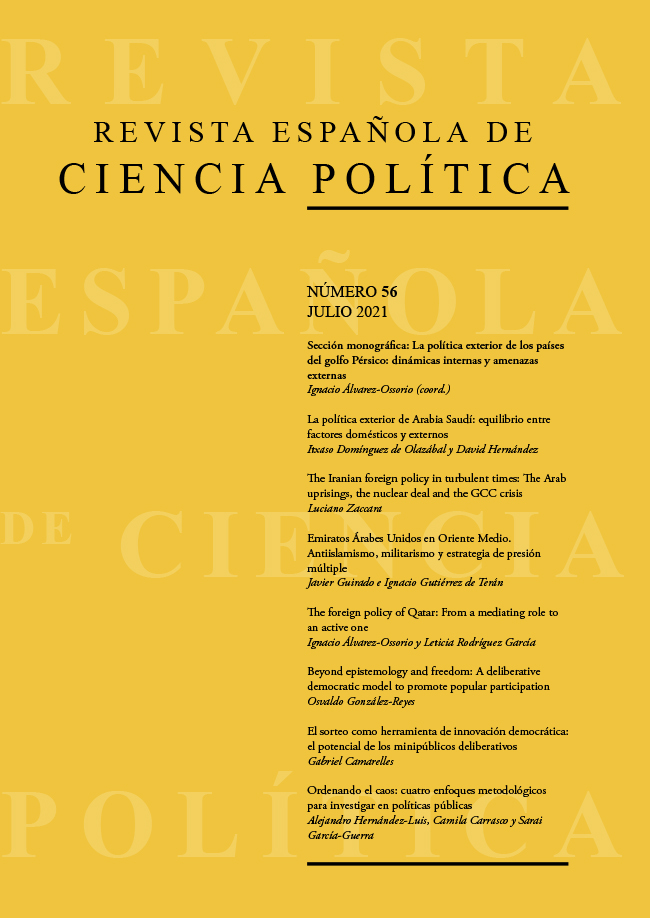Beyond epistemology and freedom: A deliberative democratic model to promote popular participation
DOI:
https://doi.org/10.21308/recp.56.05Keywords:
deliberative, democracy, epistemic, freedom, participationAbstract
In this article we thoroughly analyse one of the major problems related to current democracies, the balance between epistemic benefits and individual freedom. We dive into this debate departing form the various criticisms historically made against democracy and presenting deliberative democracy as an alternative.
This article thoroughly analyzes one of the major problems of current democracies, the balance between epistemic benefits and individual freedom. We dive into this debate departing from the various criticisms that have been historically made against democracy and presenting deliberative democracy as an alternative. Within the long deliberative democratic debate, several authors such as Christiano Mansbridge or Hélène Landemore have proposed views that fail to meet the logical and participatory standards expected from a democratic system. We carry out an analysis on these proposals reflecting on their weak points and consequences. In addition, we link these views to the discussion about the role citizens should play in any democratic system. It is concluded that the most common view held about democracy, the epistemic centred one, overlooks basic rights inherent to any individual and undermines the ability of a population to jointly thrive and develop its culture. This is the reason why we propose a flexible model where any group of citizens has substantial equality of opportunities to propose alternatives to the current norms and laws and convince the majority of the population to change them. This model has been mainly focused on the interactions between individuals and state institutions.
Downloads
References
Anderson, Elizabeth. 2006. “The epistemology of democracy”, Episteme, 3 (1-2): 8-22. Available at: https://doi.org/10.3366/epi.2006.3.1-2.8.
Bächtiger, André, John S. Dryzek, Jane Mansbridge and Mark E. Warren. 2018. “Deliberative democracy: an introduction”, in The Oxford handbook of deliberative democracy. Oxford: Oxford University Press. Available at: https://doi.org/10.1093/oxfordhb/9780198747369.001.0001.
Benítez, Octavio S. 2012. “La Constitución domesticada: algunas reflexiones críticas sobre la reforma del artículo 135 CE”, Teoría y Realidad Constitucional, 29: 409-432. Available at: https://doi.org/10.5944/trc.29.2012.6998.
Bessette, Joseph. 1994. The Mild Voice of Reason: Deliberative Democracy and American National Government. Chicago: University of Chicago Press.
Buchstein, Hubertus. 2019.”Democracy and lottery: Revisited”, Constellations, 26 (3): 361-377. Available at: https://doi.org/10.1111/1467-8675.12429.
Cherem, Max G. 2020. “May states select among refugees?”, Ethics and Global Politics, 13 (1): 33-49. Available at: https://doi.org/10.1080/16544951.2020.1735018.
Christiano, Thomas. 2012. “Rational deliberation among experts and citizens”, in John Parkinson and Jane Masbridge (eds.), Deliberative systems: Deliberative democracy at the large scale. Cambridge: Cambridge University Press.
Cortina, Adela. 1993. Ética aplicada y democracia radical. Madrid: Tecnos.
Dahl, Robert A. 2008. Polyarchy: Participation and opposition. New Haven: Yale University Press.
Dewey, John. 1927. The Public and Its Problems. Ohio: Swallow Press.
Dryzek, John. 2000. Deliberative democracy and beyond: Liberals, critics, contestations. Oxford: Oxford University Press.
Estlund, David and Hélène Landemore. 2018. “The epistemic value of democratic deliberation”, in Andre Bächtiger, John S. Dryzek, Jane Mansbridge and Mark Warren (eds.), The Oxford handbook of deliberative democracy. Oxford: Oxford University Press. Available at: https://doi.org/10.1093/oxfordhb/9780198747369.013.26.
Fishkin, James S. 2018. Democracy when the people are thinking: Revitalizing our politics through public deliberation. Oxford: Oxford University Press. Available at: https://doi.org/10.1093/oso/9780198820291.001.0001.
Fishkin, James S. and Robert C. Luskin. 2005. “Experimenting with a democratic ideal: Deliberative polling and public opinion”, Acta politica, 40 (3): 284-294. Available at: https://doi.org/10.1057/palgrave.ap.5500121.
Habermas, Jürgen. 1996. Between facts and norms. Massachusetts: MIT Press. Available at: https://doi.org/10.7551/mitpress/1564.001.0001.
Hernández, Diego Í. 2014. “La contrarreforma del Consejo General del Poder Judicial”, Teoría y Realidad Constitucional, 34: 333-348. Available at: https://doi.org/10.5944/trc.34.2014.14098.
Hong, Lu and Scott E. Page. (2004). “Groups of diverse problem solvers can outperform groups of high-ability problem solvers”, Proceedings of the National Academy of Sciences, 101 (46): 16385-16389. Available at: https://doi.org/10.1073/pnas.0403723101.
Kant, Immanuel. 1999. Critique of practical reason. Cambridge: Cambridge University Press.
Kobach, Kris W. 1993. The Referendum: Direct Democracy in Switzerland. Aldershot: Dartmouth Publishing Company.
Lafont, Cristina. 2019. Democracy without Shortcuts: A Participatory Conception of Deliberative Democracy. Oxford: Oxford University Press. Available at: https://doi.org/10.1093/oso/9780198848189.001.0001.
Lakatos, Imre. 1978, “The Methodology of Scientific Research Programmes”, Philosophical papers, 1. Available at: https://doi.org/10.1017/CBO9780511621123.
Landemore, Hélène. 2017. Democratic reason: Politics, collective intelligence, and the rule of the many. Princeton: Princeton University Press.
Mansbridge, Jane, James Bohman, Simone Chambers, Thomas Christiano, Archon Fung, John Parkinson, Dennis F. Thompson and Mark E. Warren. 2012. “A systemic approach to deliberative democracy”, in John Parkinson and Jane Mansbridge (eds.), Deliberative Systems. Deliberative Democracy at the Large Scale. Cambridge: Cambridge University Press.
Morlino, Leonardo. 2014. La calidad de las democracias en América Latina. Informe para IDEA Internacional. San José: IDEA Internacional.
Red de Conocimientos Electorales. (n. d.). El significado de la democracia. Available at: https://aceproject.org/main/espanol/ve/vec05b01.htm.
Sartre, Jean-Paul. 1946. Existentialism and Humanism. Translated by Carol Macomber. New Haven: Yale University Press.
Shook, John. 2014. Dewey’s social philosophy: Democracy as education. New York: Springer.
Wolff, Robert Paul. 1998. In defense of anarchism. California: Univ
Published
How to Cite
Issue
Section
License
Copyright (c) 2021 Osvaldo González-Reyes

This work is licensed under a Creative Commons Attribution-NonCommercial-NoDerivatives 4.0 International License.






